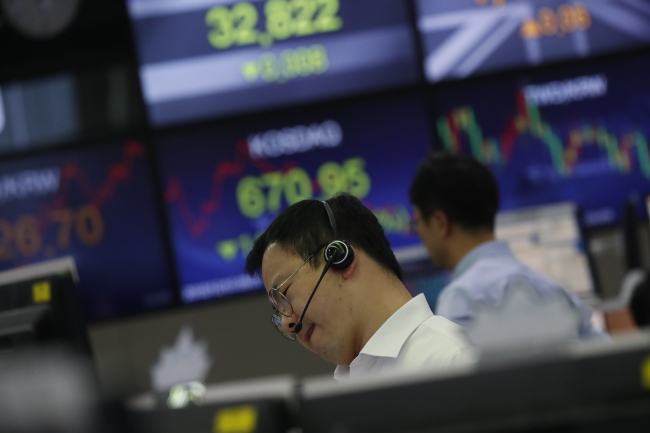Korean stocks to take biggest yearly slump since 2008 financial crisis
By Son Ji-hyoungPublished : Dec. 27, 2018 - 15:39
South Korea’s stock market indexes in 2018 are set to mark the largest yearly slump in a decade since the global financial crisis hit Asia’s fourth-largest economy in 2008.
As of the Wednesday session’s close, the main bourse index Kospi fell 17.8 percent since Jan. 2 this year, while the second-tier market benchmark Kosdaq slid 16.6 percent, according to data from the Korea Exchange on Thursday.
Both figures indicate the largest gap since 2008, when the Kospi plunged 40.7 percent and the Kosdaq sank 52.8 percent. The figures also show a sharp contrast compared to the upsurge of the previous year. The Kospi had jumped 21.8 percent, while the Kosdaq climbed 26.4 percent throughout 2017.
The main bourse index has also taken the first bearish turn in four years since the Kospi shed 4.8 percent throughout 2014, data showed.
As of the Wednesday session’s close, the main bourse index Kospi fell 17.8 percent since Jan. 2 this year, while the second-tier market benchmark Kosdaq slid 16.6 percent, according to data from the Korea Exchange on Thursday.
Both figures indicate the largest gap since 2008, when the Kospi plunged 40.7 percent and the Kosdaq sank 52.8 percent. The figures also show a sharp contrast compared to the upsurge of the previous year. The Kospi had jumped 21.8 percent, while the Kosdaq climbed 26.4 percent throughout 2017.
The main bourse index has also taken the first bearish turn in four years since the Kospi shed 4.8 percent throughout 2014, data showed.

Throughout 2018, the domestic stock market suffered heightened volatility due to uncertainties at home and abroad, triggering risk-averse investor sentiment.
In particular, both indexes slid sharply in October. The Kospi sank 13.6 percent, while the Kosdaq slumped 21.1 percent through the single month. On Oct. 29, the Kospi hit the lowest in 22 months, while the Kosdaq ended at a 15-month low.
The unraveling trade war between the United States and China has constantly battered the Korean stock market, even after the two countries in December agreed to halt new trade tariffs for 90 days.
In addition, doubts on the high valuation of tech stocks in the US contributed to the end of the record rally in the US stock market, creating ripple effects in the Korean market led by semiconductor giants such as Samsung Electronics and SK hynix.
Meanwhile, widened interest rate differentials between Korea and the US -- currently at a maximum 0.75 percentage point -- have drawn concerns about foreign capital flight here. The US Federal Reserve implemented four rate hikes by 0.25 percentage point this year, while the Bank of Korea raised the base rate once.
Uncertainties in the domestic biotechnology sector also weighed on the market, as allegations of accounting misconduct raised by the financial authorities roiled listed biotech companies. Stock trading of biosimilar maker Samsung BioLogics was suspended for about a month until mid-December, while drug distributor Celltrion Healthcare is currently being probed by the Financial Supervisory Service.
On Thursday, market indexes were slightly higher. The Kospi remained flat from the previous day’s close, while the Kosdaq ended 0.3 percent higher.
Korean stock markets operate through Friday for this year.
By Son Ji-hyoung
(consnow@heraldcorp.com)
In particular, both indexes slid sharply in October. The Kospi sank 13.6 percent, while the Kosdaq slumped 21.1 percent through the single month. On Oct. 29, the Kospi hit the lowest in 22 months, while the Kosdaq ended at a 15-month low.
The unraveling trade war between the United States and China has constantly battered the Korean stock market, even after the two countries in December agreed to halt new trade tariffs for 90 days.
In addition, doubts on the high valuation of tech stocks in the US contributed to the end of the record rally in the US stock market, creating ripple effects in the Korean market led by semiconductor giants such as Samsung Electronics and SK hynix.
Meanwhile, widened interest rate differentials between Korea and the US -- currently at a maximum 0.75 percentage point -- have drawn concerns about foreign capital flight here. The US Federal Reserve implemented four rate hikes by 0.25 percentage point this year, while the Bank of Korea raised the base rate once.
Uncertainties in the domestic biotechnology sector also weighed on the market, as allegations of accounting misconduct raised by the financial authorities roiled listed biotech companies. Stock trading of biosimilar maker Samsung BioLogics was suspended for about a month until mid-December, while drug distributor Celltrion Healthcare is currently being probed by the Financial Supervisory Service.
On Thursday, market indexes were slightly higher. The Kospi remained flat from the previous day’s close, while the Kosdaq ended 0.3 percent higher.
Korean stock markets operate through Friday for this year.
By Son Ji-hyoung
(consnow@heraldcorp.com)






![[KH Explains] How should Korea adjust its trade defenses against Chinese EVs?](http://res.heraldm.com/phpwas/restmb_idxmake.php?idx=644&simg=/content/image/2024/04/15/20240415050562_0.jpg&u=20240415144419)












![[Today’s K-pop] Stray Kids to return soon: report](http://res.heraldm.com/phpwas/restmb_idxmake.php?idx=642&simg=/content/image/2024/04/16/20240416050713_0.jpg&u=)